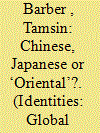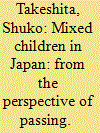| Srl | Item |
| 1 |
ID:
138943


|
|
|
|
|
| Summary/Abstract |
The young British-born Vietnamese are a relatively invisible group in ‘super-diverse’ London who are often misidentified in their everyday encounters. Eluding more straightforward processes of ethnic or racial assignment, the young Vietnamese ‘pass’ in various different ways as Chinese, Japanese, Korean, Thai or ‘Oriental’. Drawing upon primary interview data and participant observation, this article traces ‘passive’ and ‘deliberate’ forms of passing to highlight how intersecting processes of class, gender and place enable/engender different kinds of passing. It is argued that Vietnamese-passing challenges more ‘celebratory’ readings of (super-) diversity by concealing (and depoliticising) difference and erasing Vietnamese voices rather than allowing for their proliferation. It is suggested that practices of passing may become more common in super-diverse societies, as markers of visible difference become increasingly complex and less determinable, especially among newer, non-colonial migrant groups who are more ambiguously positioned within existing identity regimes.
|
|
|
|
|
|
|
|
|
|
|
|
|
|
|
|
| 2 |
ID:
174810


|
|
|
|
|
| Summary/Abstract |
This study adopts Goffman’s concept of ‘passing’ to discuss the experiences of mixed children in Japan. Passing is ‘the management of undisclosed discrediting information about self’ and is a concept that has been evolved in the context of stigma. Since 1999, The author has conducted interviews with 139 mixed families of diverse nationalities and religions residing in Japanese urban areas. The aim of this research is to unravel two issues: First, do mixed children perceive their mixed background as a stigma? And second, do passing mixed children feel insecure or guilty about the fact that they are passing? This article concludes that whether or not the child is ‘visibly’ different from other children in Japanese society, and how their parents and teachers perceive their situations are major factors shaping the children’s experiences.
|
|
|
|
|
|
|
|
|
|
|
|
|
|
|
|